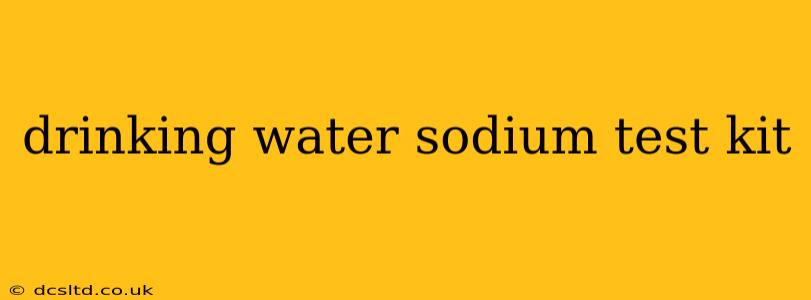Are you concerned about the sodium levels in your drinking water? Understanding your water's sodium content is crucial for maintaining good health, especially for individuals on low-sodium diets due to medical conditions like hypertension. This comprehensive guide will explore drinking water sodium test kits, helping you choose the right one and interpret your results.
What are Drinking Water Sodium Test Kits?
Drinking water sodium test kits are convenient tools that allow you to measure the concentration of sodium (Na) in your tap water or other water sources. These kits vary in accuracy, ease of use, and price, offering options suitable for both home use and more precise laboratory-grade testing. They're essential for monitoring sodium intake, especially when relying on well water or suspecting high sodium levels due to location or water source.
How Accurate are Home Test Kits for Sodium in Water?
The accuracy of home water sodium test kits can vary greatly. Some provide a general indication of high, medium, or low sodium levels, while others offer more precise quantitative measurements, often expressed in parts per million (ppm) or milligrams per liter (mg/L). It's crucial to check the kit's specifications to understand its accuracy range and limitations. Home test kits are suitable for general monitoring, but for extremely precise measurements, laboratory testing is recommended.
What are the Different Types of Drinking Water Sodium Test Kits?
Several types of drinking water sodium test kits are available:
-
Test Strips: These are the simplest and most affordable option, often offering a color-coded comparison to determine the approximate sodium concentration. They are less precise than other methods but provide a quick and easy way to check for high levels.
-
Liquid Reagent Kits: These kits utilize chemical reactions to quantify sodium levels. They usually offer better accuracy than test strips, although still not as precise as laboratory methods. These involve adding reagents to a water sample and comparing the color change to a standard chart.
-
Digital Meters: These are more advanced kits that provide digital readings, often in ppm or mg/L. These offer the highest accuracy among home test kits and often come with calibration solutions for ongoing accuracy.
How Do I Use a Drinking Water Sodium Test Kit?
The instructions for using a drinking water sodium test kit vary depending on the type. However, generally, the process involves collecting a water sample, adding the appropriate reagents (if applicable), and comparing the resulting color or digital reading to the provided chart or scale. Always carefully follow the instructions included with your specific kit.
What are the Health Concerns Related to High Sodium Levels in Drinking Water?
High sodium levels in drinking water can contribute to several health problems, particularly for individuals with hypertension (high blood pressure), heart disease, or kidney disease. Excessive sodium intake can increase blood volume, leading to higher blood pressure. Therefore, monitoring sodium levels in drinking water is critical, especially for vulnerable populations.
How Often Should I Test My Drinking Water for Sodium?
The frequency of testing depends on several factors, including your health concerns, the source of your water, and any changes to your water supply. For individuals with health conditions sensitive to sodium, more frequent testing might be recommended. If you're on a low-sodium diet, regular testing can help you monitor your intake effectively.
What Should I Do if My Drinking Water Sodium Test Shows High Levels?
If your drinking water sodium test shows high levels, consult your doctor or a qualified water treatment professional. They can advise you on the best course of action, which might involve using a water softener or installing a reverse osmosis system to reduce sodium content. They can also provide guidance on managing your sodium intake through diet and other lifestyle choices.
Where Can I Buy a Drinking Water Sodium Test Kit?
Drinking water sodium test kits are readily available online from various retailers and at some local home improvement stores. When choosing a kit, consider its accuracy, ease of use, and cost. It's essential to choose a reputable brand to ensure reliable results.
This information is for general knowledge and should not be considered medical or professional water treatment advice. Always consult with relevant professionals for personalized guidance.
